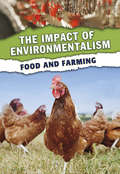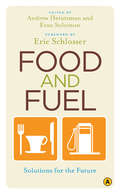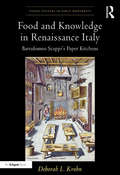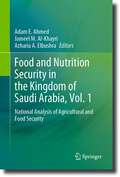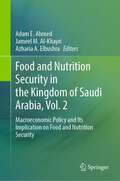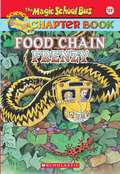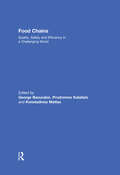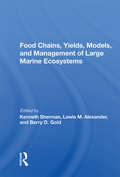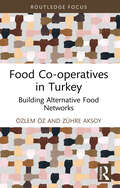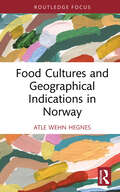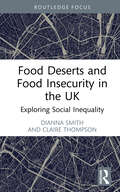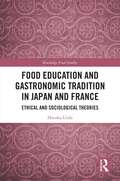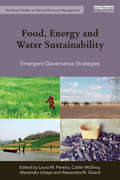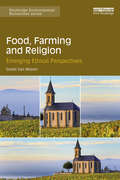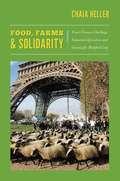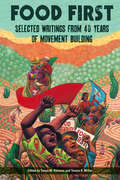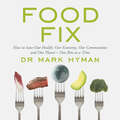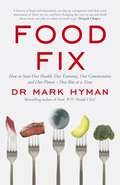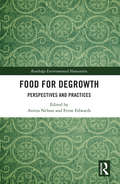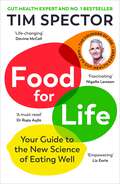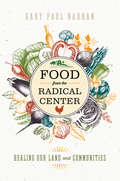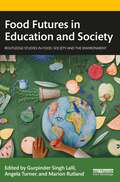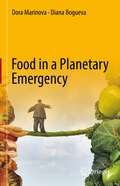- Table View
- List View
Food and Farming (The Impact of Environmentalism)
by Jen GreenWe are all aware of the importance of the environment - it's in the news, it affects our behavior and the decisions we make every day. But what actual impact has environmental thinking had on the world around us? This thought-provoking book looks at the way changing ideas about the environment and sustainability have affected the way we obtain our food, and will do so in the future.
Food and Fuel: Solutions for the Future
by Andrew Heintzman Evan SolomonThe twenty-first century has been dominated by two major global crises: a scarcity of food and fuel. Both have had detrimental effects on the environment and both are at the root of the fragile health of the global economy. Combining the best of the critically acclaimed Fuelling the Future and Feeding the Future, this timely and provocative collection of essays from leading thinkers such as Thomas Homer-Dixon, Gordon Laird, Jeremy Rifkin, Frances Moore Lappe, and Anna Lappe offers valuable strategies to combat global famine and fast-food fat; business models for sustainable food production and power sources; and descriptions of emerging technologies and sciences.
Food and Knowledge in Renaissance Italy: Bartolomeo Scappi's Paper Kitchens (Visual Culture In Early Modernity Ser.)
by Deborah L KrohnThough Bartolomeo Scappi's Opera (1570), the first illustrated cookbook, is well known to historians of food, up to now there has been no study of its illustrations, unique in printed books through the early seventeenth century. In Food and Knowledge in Renaissance Italy, Krohn both treats the illustrations in Scappi's cookbook as visual evidence for a lost material reality; and through the illustrations, including several newly-discovered hand-colored examples, connects Scappi's Opera with other types of late Renaissance illustrated books. What emerges from both of these approaches is a new way of thinking about the place of cookbooks in the history of knowledge. Krohn argues that with the increasing professionalization of many skills and trades, Scappi was at the vanguard of a new way of looking not just at the kitchen-as workshop or laboratory-but at the ways in which artisanal knowledge was visualized and disseminated by a range of craftsmen, from engineers to architects. The recipes in Scappi's Opera belong on the one hand to a genre of cookery books, household manuals, and courtesy books that was well established by the middle of the sixteenth century, but the illustrations suggest connections to an entirely different and emergent world of knowledge. It is through study of the illustrations that these connections are discerned, explained, and interpreted. As one of the most important cookbooks for early modern Europe, the time is ripe for a focused study of Scappi's Opera in the various contexts in which Krohn frames it: book history, antiquarianism, and visual studies.
Food and Nutrition Security in the Kingdom of Saudi Arabia, Vol. 1: National Analysis of Agricultural and Food Security
by Adam E. Ahmed Jameel M. Al-Khayri Azharia A. ElbushraFood and nutrition security is a major concern for Saudi Arabia and the surrounding regions due to the range of challenges they face. These challenges include limited agricultural resources, low self-sufficiency in key food staples, climate change, and high levels of food loss and waste. This book aims to evaluate and analyze the current situation and future prospects of food and nutrition security in Saudi Arabia. Additionally, it seeks to analyze and assess the roles and functions of various institutions related to food security, providing a deeper understanding of the complex problems associated with it. Furthermore, this book aligns with Kingdom Vision 2030, which includes a set of strategies and programs focused on agriculture, food, and water security. It also aligns with the institutional identity of King Faisal University's "Food Security and Environmental Sustainability".The book consists of four volumes. Volume 1, entitled "National Analysis of Agriculture and Food Security" aims to assess the current state of food security in Saudi Arabia, covering key aspects such as agriculture and food resources, food systems, crops, livestock, poultry, fisheries, animal health, food loss and waste, transportation and strategic reserve infrastructure, food security institutions, population, agricultural extension, climate change, agricultural mechanization, smart agriculture, and the utilization of solar energy.This book is highly significant for professionals, researchers, policymakers, and entrepreneurs involved in food and nutrition security in Saudi Arabia, the Gulf Cooperation Council, and various national and international organizations. It offers a comprehensive analysis of the obstacles and possibilities in ensuring food and nutrition security, as well as presenting practical approaches to address these issues. Additionally, graduate students studying in fields related to food and nutrition security will benefit from this book.
Food and Nutrition Security in the Kingdom of Saudi Arabia, Vol. 2: Macroeconomic Policy and Its Implication on Food and Nutrition Security
by Adam E. Ahmed Jameel M. Al-Khayri Azharia A. ElbushraFood and nutrition security is a major concern for Saudi Arabia and the surrounding regions due to the range of challenges they face. These challenges include limited agricultural resources, low self-sufficiency in key food staples, climate change, and high levels of food loss and waste. This book aims to evaluate and analyze the current situation and future prospects of food and nutrition security in Saudi Arabia. Additionally, it seeks to analyze and assess the roles and functions of various institutions related to food security, providing a deeper understanding of the complex problems associated with it. Furthermore, this book aligns with Kingdom Vision 2030, which includes a set of strategies and programs focused on agriculture, food, and water security. It also aligns with the institutional identity of King Faisal University's "Food Security and Environmental Sustainability".The book consists of four volumes. Volume 2 is entitled "Macroeconomic Policy Implications on Food and Nutrition Security". It covers various areas, including food price, loss and waste, processing, finance, trade, investment, quality and safety, consumption patterns, climate change, early warning systems, nutrition institutions, oil revenue, and the significance of date palm and Hassawi rice, genetically modified food, and edible insects in ensuring food and nutritional security.This book is highly significant for professionals, researchers, policymakers, and entrepreneurs involved in food and nutrition security in Saudi Arabia, the Gulf Cooperation Council, and various national and international organizations. It offers a comprehensive analysis of the obstacles and possibilities in ensuring food and nutrition security, as well as presenting practical approaches to address these issues. Additionally, graduate students studying in fields related to food and nutrition security will benefit from this book.
Food Chain Frenzy (Magic School House Chapter Book #17)
by Anne Capeci John SpeirsArnold, Ms. Frizzle, and the whole Magic School Bus crew find themselves in a Food Chain Frenzy as they digest lots of fab facts on ecosystems and eating habits.<P><P> Ms. Frizzle is the weirdest teacher around, and Arnold is her most reluctant student. A field trip on the Magic School Bus can be torture for Arnold, and there is just one thing that can make it worse: his cousin Janet. With his know-it-all relative's visit combined with an all-wheel learning adventure, it is sure to be a school day Arnold won't soon forget. The Friz is always hungry for adventure, and that's just what the class gets. With so much to learn about ecosystems, even Arnold finds himself eating up all the food-chain facts.
Food Chain Frenzy (Magic School Bus Chapter Book #17)
by Anne Capeci John SpeirsArnold, Ms. Frizzle, and the whole Magic School Bus crew find themselves in a Food Chain Frenzy as they digest lots of fab facts on ecosystems and eating habits.<P><P> Ms. Frizzle is the weirdest teacher around, and Arnold is her most reluctant student. A field trip on the Magic School Bus can be torture for Arnold, and there is just one thing that can make it worse: his cousin Janet. With his know-it-all relative's visit combined with an all-wheel learning adventure, it is sure to be a school day Arnold won't soon forget. The Friz is always hungry for adventure, and that's just what the class gets. With so much to learn about ecosystems, even Arnold finds himself eating up all the food-chain facts.
Food Chains: Cooperative Approaches For A Changing World (Cooperative Management Ser.)
by George Baourakis Prodromos Kalaitzis Konstadinos MattasFood Chains: Quality, Safety and Efficiency in a Challenging World addresses the many issues facing European food producers and other food chain stakeholders, who endeavour to improve their competitive position in a highly competitive world food market. The Food Chain is one of the main economic pillars in Europe, providing employment and opportunities for economic development in rural areas. It is therefore imperative to continuously monitor the changes that affect the sector, in order to allow stakeholders to respond promptly and effectively to the new market conditions. Adjusting to the new market involves new technology, globalization, demographic and social changes within a challenging market environment. In order to adopt these new market parameters, food chain stakeholders need to adapt their activities in order to gain in terms of effectiveness and efficiency.This book was originally published as a special issue of Food Economics - Acta Agriculture Scandinavica, Section C.
Food Chains and Webs
by Holly WallaceFood Chains and Webs looks at the way plants and animals in a particular place are connected by what they eat. Because green plants can make their own food, they begin every food chain and web. All animals, including people, rely on plants for their food.
Food Chains, Yields, Models, And Management Of Large Marine Ecosoystems
by Kenneth ShermanDraws on case studies from tropical, temperate, and Arctic waters around the world, comparing multispecies biomass yield models for various large marine ecosystems. Emphasis is given to adaptive management as a strategy for maximizing the sustainability and productivity of living marine resources.
Food Co-operatives in Turkey: Building Alternative Food Networks (Routledge Focus on Environment and Sustainability)
by Özlem Öz Zühre AksoyThis book addresses the roles played by food co-operatives in the attempt to build alternative food networks, drawing on an in-depth analysis of case studies in Turkey. While many existing studies focus on food co-operatives and alternative food networks in the Global North, this book provides an important insight into a country from the Global South and, in doing so, not only provides a novel perspective but also challenges the rigid North–South categorization. The book provides a rounded view by examining both a producer and a consumer co-operative: BÜKOOP is a university-based consumer food co-operative, and the Vakıflı co-operative is a food-producing co-operative located in the Hatay province on the Mediterranean coast of Turkey. These two co-operatives, which have been working together for more than ten years, share the dream of establishing a network of co-operatives, in which producers exist in solidarity with consumers, blurring the dichotomy of producer versus consumer as well as rural versus urban. In addition to contributing towards a better understanding of the urban–rural divide, within the framework of alternative food networks, the in-depth analysis of these two cases enables us to explore how food co-operatives develop and how they keep their commitment to their original goals and ideals so as to help build an alternative food system. The lessons we learn from these two working case examples highlight the successes and areas of improvement for food co-operatives. They also provide evidence against the pessimism about alternative food networks by demonstrating that co-operatives can democratize both production and consumption. This book will be of interest to students and scholars studying alternative food networks, food justice, food sovereignty, transformation towards sustainable food systems, social movements, and the urban–rural divide.
Food Cultures and Geographical Indications in Norway (Routledge Focus on Environment and Sustainability)
by Atle Wehn HegnesThis book analyses the implementation and challenges of using Geographical Indications in Norway. Adapting the modern and global system of Geographical Indications (GIs) to food cultures is a recurring challenge. This text uses Norway as a case study to describe, understand, and explain the socio-cultural adaptation of GIs. The empirical analysis shows that administrators, producers, consultants, and others make a significant effort to adapt the scheme to Norwegian food culture and the food culture to the scheme. Through the development and use of a new conceptual framework, the book continues to show how adaptations occurred and their influence on the development of the Norwegian food culture. The author also reflects upon the status of Norwegian GIs in emerging food cultural contexts related to sustainable and technology change. In summary, this book exhibits the connection between modern global legislative arrangements and traditional local products, providing a springboard for further research on cultural adaptation work of GIs in established and future global food cultures. This book will be of interest to researchers, policymakers, and students in agri-food studies, sociology of food and agriculture, agricultural and rural development, and cultural studies.
Food Deserts and Food Insecurity in the UK: Exploring Social Inequality (Routledge Focus on Environment and Sustainability)
by Dianna Smith Claire ThompsonThis book examines the social inequalities relating to food insecurity in the UK, as well as drawing parallels with the US. Access to food in the UK, and especially access to healthy food, is a constant source of worry for many in this wealthy country. Crises, such as the COVID-19 pandemic, have coincided with a steep rise in the cost of living, meaning household food insecurity has become a reality for many more households. This book introduces a new framework to examine the many influences on local-level food inequalities, whether they result from individual circumstances or where a person lives. The framework will allow researchers new to the field to consider the many influences on food security, and to support emerging research around different sub-topics of food access and food security. Providing a thorough background to two key concepts, food deserts and food insecurity, the book documents the transition from area-based framing of food resources, to approaches which focus on household food poverty and the rise of food banks. The book invites researchers to acknowledge and explore the ever changing range of place-based factors that shape experiences of food insecurity: from transport and employment to rural isolation and local politics. By proposing a new framework for food insecurity research and by drawing on real-world examples, this book will support academic and applied researchers as they work to understand and mitigate the impacts of food insecurity in local communities. This book will be of great interest to students and scholars of food and nutrition security, public health, and sociology. It will also appeal to food policy professionals and policymakers who are working to address social inequalities and improve access to healthy and nutritious food for all.
Food Education and Gastronomic Tradition in Japan and France: Ethical and Sociological Theories (Routledge Food Studies)
by Haruka UedaDrawing on ethical and sociological theories of food, this book presents a new approach to food education that moves beyond nutrition-centred education. Food education has gained increasing scientific and political importance in many countries as a promising way to change contemporary eating. However, many practices fail to address two epistemological obstacles regarding its very components – ‘food’ and ‘education’. Food has largely been thought of from a nutritionistic viewpoint alone and the ethical issues over children’s freedom of choice and well-being have been absent. This book resolves these problems by applying ethical and sociological theories of food and analysing food education in two pioneering countries: Japan and France. The book focuses on taste education and gastronomy as two key concepts which have great potential to positively impact food education. Taste education is a promising alternative to nutrition-centred pedagogy which foregrounds the experience and pleasure of eating food, creating an environment for taste sensibility and food curiosity. From taste education, the picture can be broadened to examine the role and impact of gastronomy in food education. Examining the cultural traditions of France and Japan reveals how gastronomy can impact eating habits and food cultures and how these criteria should be an intrinsic part of food education. The book concludes by constructing an integrative theory for food education that moves beyond nutrition-centred education for the benefit of one’s well-being. This book will greatly interest students, scholars, policymakers and educators working on food education, food-related issues at the intersection between nutritional and social sciences, and ‘gastronomes’ searching for a pedagogical guide for developing their capabilities to eat in a more humanistic way.
Food, Energy and Water Sustainability: Emergent Governance Strategies (Earthscan Studies in Natural Resource Management)
by Laura M. Pereira Caitlin A. McElroy Alexandra Littaye Alexandra M. GirardSocieties around the world face an increasingly uncertain future as social and ecological changes create pressure on resource governance, and this uncertainty calls for new models that illuminate the intersections of civil society, public sector, and private sector resource management. This volume presents a diversity of collaborations between various governance actors in the management of the Food-Energy-Water (FEW) nexus. It analyses the ability of emergent governance structures to cope with the complexity of future challenges across FEW systems. Divided into two sections, chapters in the first half of the book present a collection of case studies from around the world exemplifying how FEW nexus challenges are addressed in a multitude of ways and by a variety of actors. Chapters in the second half offer broader perspectives on the management of FEW and underline the lessons that emerge from applying a FEW lens to the question of natural resource governance. The varied examples in this book highlight that the management of FEW is often a question of reinventing, adapting, and building upon existing practices. Such practices are deeply embedded in unique socio-cultural, environmental, and political contexts as well as ‘hard’ infrastructures. Most of all, this edited volume seeks to communicate the wealth of ideas from committed individuals who continue to work to improve natural resource governance and our sustainable futures.
Food, Farming and Religion: Emerging Ethical Perspectives (Routledge Environmental Humanities)
by Gretel Van WierenAlthough the religious and ethical consideration of food and eating is not a new phenomenon, the debate about food and eating today is distinctly different from most of what has preceded it in the history of Western culture. Yet the field of environmental ethics, especially religious approaches to environmental ethics, has been slow to see food and agriculture as topics worthy of analysis. This book examines how religious traditions and communities in the United States and beyond are responding to critical environmental ethical issues posed by the global food system. In particular, it looks at the responses that have developed within Jewish, Christian, and Islamic traditions, and shows how they relate to arguments and approaches in the broader study of food and environmental ethics. It considers topics such as land degradation and restoration, genetically modified organisms and seed consolidation, animal welfare, water use, access, pollution, and climate, and weaves consideration of human wellbeing and justice throughout. In doing so, Gretel Van Wieren proposes a model for conceptualizing agricultural and food practices in sacred terms. This book will appeal to a wide and interdisciplinary audience including those interested in environment and sustainability, food studies, ethics, and religion.
Food, Farms, and Solidarity: French Farmers Challenge Industrial Agriculture and Genetically Modified Crops (New ecologies for the twenty-first century)
by Chaia HellerThe Confédération Paysanne, one of France's largest farmers' unions, has successfully fought against genetically modified organisms (GMOs), but unlike other allied movements, theirs has been led by producers rather than consumers. In Food, Farms, and Solidarity, Chaia Heller analyzes the group's complex strategies and campaigns, including a call for a Europe-wide ban on GM crops and hormone-treated beef, and a protest staged at a McDonald's. Her study of the Confédération Paysanne shows the challenges small farms face in a postindustrial agricultural world. Heller also reveals how the language the union uses to argue against GMOs encompasses more than the risks they pose; emphasizing solidarity has allowed farmers to focus on food as a cultural practice and align themselves with other workers. Heller's examination of the Confédération Paysanne's commitment to a vision of alter-globalization, the idea of substantive alternatives to neoliberal globalization, demonstrates how ecological and social justice can be restored in the world.
Food First: Selected Writings from 40 Years of Movement Building
by Teresa K Miller Tanya M KerssenThis book looks back on forty years of writings from the Oakland-based Institute for Food and Development Policy, better known as Food First, on the occasion of its 40th anniversary. The book highlights the breadth and depth of the organization's published works, addressing issues such as hunger, international trade, US foreign policy, the Green Revolution, agroecology, climate justice, land reform, food and farm workers' rights, and food sovereignty.
Food Fix: How to Save Our Health, Our Economy, Our Communities and Our Planet – One Bite at a Time
by Mark HymanOur most powerful tool to reverse the global epidemic of chronic disease, heal the environment, reform politics, and revive economies is food. What we eat has tremendous implications not just for our waistlines, but also for the planet, society, and the global economy. What we do to our bodies, we do to the planet; and what we do to the planet, we do to our bodies.In Food Fix Mark Hyman explains how our food and agriculture policies are corrupted by money and lobbies that drive our biggest global crises: the spread of obesity and food-related chronic disease, climate change, poverty, violence, educational achievement gaps, and more. He provides solutions for citizens, businesses, and policy makers to create a healthier world, society, and planet.Pairing the latest developments in nutritional and environmental science with an unflinching look at the dark realities of the global food system and the policies that make it possible, Food Fix is a passionate call to arms that will change the way you think about - and eat - food forever.(P) 2020 Hachette Audio
Food Fix: How to Save Our Health, Our Economy, Our Communities and Our Planet – One Bite at a Time
by Mark HymanOur most powerful tool to reverse the global epidemic of chronic disease, heal the environment, reform politics, and revive economies is food. What we eat has tremendous implications not just for our waistlines, but also for the planet, society, and the global economy. What we do to our bodies, we do to the planet; and what we do to the planet, we do to our bodies.In Food Fix, New York Times best-selling author Mark Hyman explains how food and agriculture policies are corrupted by money and are driving a global crises: the spread of obesity and food-related chronic disease, climate change, poverty, violence, educational achievement gaps, and more. He provides solutions for citizens, businesses, and policy makers to create a healthier world, society, and planet.Pairing the latest developments in nutritional and environmental science with an unflinching look at the dark realities of the global food system and the policies that make it possible, Food Fix is a passionate call to arms that will change the way you think about - and eat - food forever.'If you're overwhelmed by the scale of the world's problems, and wondering what you can do in your own life to start, Food Fix is for you. Dr. Hyman deftly connects the dots between education, health, climate science, and the food we eat every day, showing that the choices we make about the food we put on our plates has consequences that ripple around the world.' - Arianna Huffington
Food for Degrowth: Perspectives and Practices (Routledge Environmental Humanities)
by Anitra Nelson and Ferne EdwardsThis collection breaks new ground by investigating applications of degrowth in a range of geographic, practical and theoretical contexts along the food chain. Degrowth challenges growth and advocates for everyday practices that limit socio-metabolic energy and material flows within planetary constraints. As such, the editors intend to map possibilities for food for degrowth to become established as a field of studies. International contributors offer a range of examples and possibilities to develop more sustainable, localised, resilient and healthy food systems using degrowth principles of sufficiency, frugal abundance, security, autonomy and conviviality. Chapters are clustered in parts that critically examine food for degrowth in spheres of the household, collectives, networks, and narratives of broader activism and discourses. Themes include broadening and deepening concepts of care in food provisioning and social contexts; critically applying appropriate technologies; appreciating and integrating Indigenous perspectives; challenging notions of 'waste', 'circular economies' and commodification; and addressing the ever-present impacts of market logic framed by growth. This book will be of greatest interest to students and scholars of critical food studies, sustainability studies, urban political ecology, geography, environmental studies such as environmental sociology, anthropology, ethnography, ecological economics and urban design and planning.
Food for Life: Your Guide to the New Science of Eating Well from the #1 Sunday Times bestseller
by Tim Spector‘Life-changing' DAVINA McCALL'A must-read' DR RUPY AUJLA'Fascinating' NIGELLA LAWSON**AS SEEN ON THE ONE SHOW**Empowering and practical, Food for Life is nothing less than a new approach to how to eat - for our health and the health of the planet.Food is our greatest ally for good health, but the question of what to eat in the age of ultra-processed food has never seemed so complicated.Drawing on cutting-edge research and personal insights, Professor Tim Spector offers clear answers in this definitive, easy-to-follow guide to the new science of eating well.‘No fads, no nonsense, just practical, science-based advice on how to eat well’ Daily Mail, Books of the Year'A rigorously academic book that welcomes the layperson with open arms' The Times** A THE TIMES and SUNDAY TIMES BOOK OF THE YEAR**** WINNER OF THE FORTNUM & MASON SPECIAL AWARD **Go with your gut. Join the food revolution.**PRE-ORDER THE FOOD FOR LIFE COOKBOOK, COMING OCTOBER 2024, NOW**
Food from the Radical Center: Healing Our Land and Communities
by Gary Paul Nabhan"Informational and inspirational."—BooklistAmerica has never felt more divided. But in the midst of all the acrimony comes one of the most promising movements in our country's history. People of all races, faiths, and political persuasions are coming together to restore America's natural wealth: its ability to produce healthy foods.In Food from the Radical Center, Gary Nabhan tells the stories of diverse communities who are getting their hands dirty and bringing back North America's unique fare: bison, sturgeon, camas lilies, ancient grains, turkeys, and more. These efforts have united people from the left and right, rural and urban, faith-based and science-based, in game-changing collaborations. Their successes are extraordinary by any measure, whether economic, ecological, or social. In fact, the restoration of land and rare species has provided—dollar for dollar—one of the best returns on investment of any conservation initiative.As a leading thinker and seasoned practitioner in biocultural conservation, Nabhan offers a truly unique perspective on the movement. He draws on fifty years of work with community-based projects around the nation, from the desert Southwest to the low country of the Southeast. Yet Nabhan's most enduring legacy may be his message of hope: a vision of a new environmentalism that is just and inclusive, allowing former adversaries to commune over delicious foods.
Food Futures in Education and Society (Routledge Studies in Food, Society and the Environment)
by Gurpinder Singh Lalli Angela Turner Marion RutlandThis book brings together a unique collection of chapters to facilitate a broad discussion on food education that will stimulate readers to think about key policies, recent research, curriculum positions and how to engage with key stakeholders about the future of food. Food education has gained much attention because the challenges that influence food availability and eating in schools also extend beyond the school gate. Accordingly, this book establishes evidence-based arguments that recognise the many facets of food education, and reveal how learning through a future's lens and joined-up thinking is critical for shaping intergenerational fairness concerning food futures in education and society. This book is distinctive through its multidisciplinary collection of chapters on food education with a particular focus on the Global North, with case studies from England, Australia, the Republic of Ireland, the United States of America, Canada and Germany. With a focus on three key themes and a rigorous food futures framework, the book is structured into three sections: (i) food education, pedagogy and curriculum, (ii) knowledge and skill diversity associated with food and health learning and (iii) food education inclusivity, culture and agency. Overall, this volume extends and challenges current research and theory in the area of food education and food pedagogy and offers insight and tangible benefits for the future development of food education policies and curricula. This book will be of great interest to students, scholars, policymakers and education leaders working on food education and pedagogy, food policy, health and diet and the sociology of food.
Food in a Planetary Emergency
by Dora Marinova Diana BoguevaThis book Food in a Planetary Emergency is a timely overview of the current food systems and the required transformations to respond to the challenges of climate change, population pressures, biodiversity loss and use of natural resources, such as soils, water and phosphorus. This book takes a planetary health perspective which explores the links between natural systems and human wellbeing implying that there is need for united actions to achieve important environmental and population health co-benefits.This book outlines that the foundation of planetary health is sustainability. It addresses environment and climate change emergency as a global agenda, however, emphasises the urgency of the sustainability perspective which integrates a wide spectrum of issues that require integrated solutions to offer better prospects for humanity. This book drives this argument further through the global Sustainable Development Goals (SDGs) where food is not just SDG2 but transcends all 17 goals.This book tackles the problems of food production and consumption at a global, industry and individual level linking it to topics related to the natural environment, climate change, waste, marketing, new ways of producing food and providing alternative proteins, mitigating non-communicable diseases, flexitarianism and the role of Generation Z in the emerging dietary choices.This book benefits readers with understanding the importance and intricacy of their dietary choices at a point in time when our planet is facing an emergency triggered by long-term dependence on fossil fuels and artificial fertilisers but also by the ways we have provided food. However, this book also delivers the message that safeguarding and sustaining planetary health is possible.
